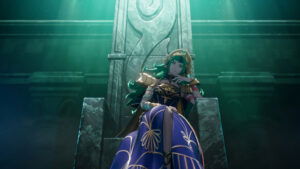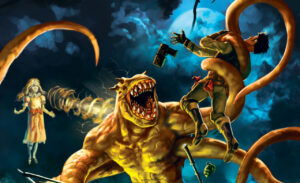As a longtime Final Fantasy fan, one thing that’s ever-present on my wishlist is a new Dissidia spin-off—so the recent announcement of Dissidia Duellum Final Fantasy, a brand new game arrived next year, was a pleasant surprise, at first.
However, despite being named in Latin and after the PlayStation Portable-era fighting game, Dissidia Duellum takes a very unconventional approach to Square Enix’s storied franchise. In an alternate version of real-world Tokyo, heroes from across Final Fantasy‘s mainline games live amongst everyday people and protect them from monster incursions by engaging in “Player vs Player vs Event” battles.
It’s a bit kooky in theory, but after participating in the closed beta last week, I can safely say it may have the potential to be a solid spin-off. But while I have a good feeling about this, I also have just as many concerns about Dissidia Duellum‘s potential future.
A Surprisingly Fun Formula
Final Fantasy is no stranger to mobile games at this point, having released over a dozen titles for smartphones bearing the name (or a loose association) over the last fifteen years. Most of the “real,” or more authentic, mobile games have been a pretty diverse bunch, in terms of concept and gameplay: Final Fantasy Record Keeper (RIP king) translated the entire series into a quintessential turn-based format, Mobius Final Fantasy put a new spin on the original game’s mythos before Stranger of Paradise made it meme-worthy, and Final Fantasy All the Bravest… existed, for a time.
So it’s not surprising, necessarily, that Dissidia Duellum Final Fantasy is swinging for the fences with a very different tone and playstyle. It was almost a matter of time before the series took a swing at online arena-like gameplay in this vein. After trying the series’ attempts at copying Monster Hunter, Fortnite, and Dark Souls‘ homework, I was open to a vaguely MOBA-like format… and once through the breezy tutorials and into actual matches against other beta players, I quickly saw the potential of Dissidia Duellum‘s formula.
Dissidia Duellum has immediately fallen off a ledge that even one of its most ill-fated ancestors dodged.
Teams of 3 must coordinate to capture giant crystals scattered around the stage, by clearing the area of monsters and then attacking the crystal. Seizing one of these zones fills a player’s Bravery, in keeping with Dissidia‘s original mechanics; once the Brave gauge is full, players can go into a temporary super state which allows them to actually inflict damage upon the match’s boss. The team that defeats the monster first wins; this makes working the core mechanic key, like any online co-op, but also leaves the door open for plenty of different strategies, like intercepting the other team.
Outside of matches, players can set different abilities for their characters—some generic, like typical spells (Fire/Fira, Cure/Cura, etc), and others unique to that character. Characters and abilities are largely unlocked through the gacha system, but at least in the beta, there were ample opportunities to earn other guaranteed characters by playing many rounds (and, ideally, winning).
Despite being very restrictive in terms of available playing times, I quickly found Dissidia Duellum to be a fun evening diversion, the kind of thing you play a couple rounds of to unwind.
Lack of Control
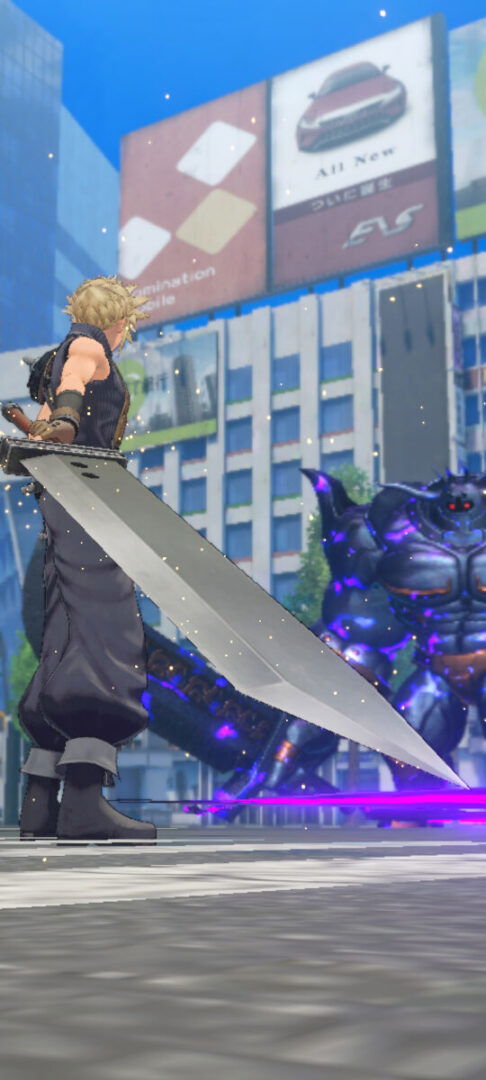
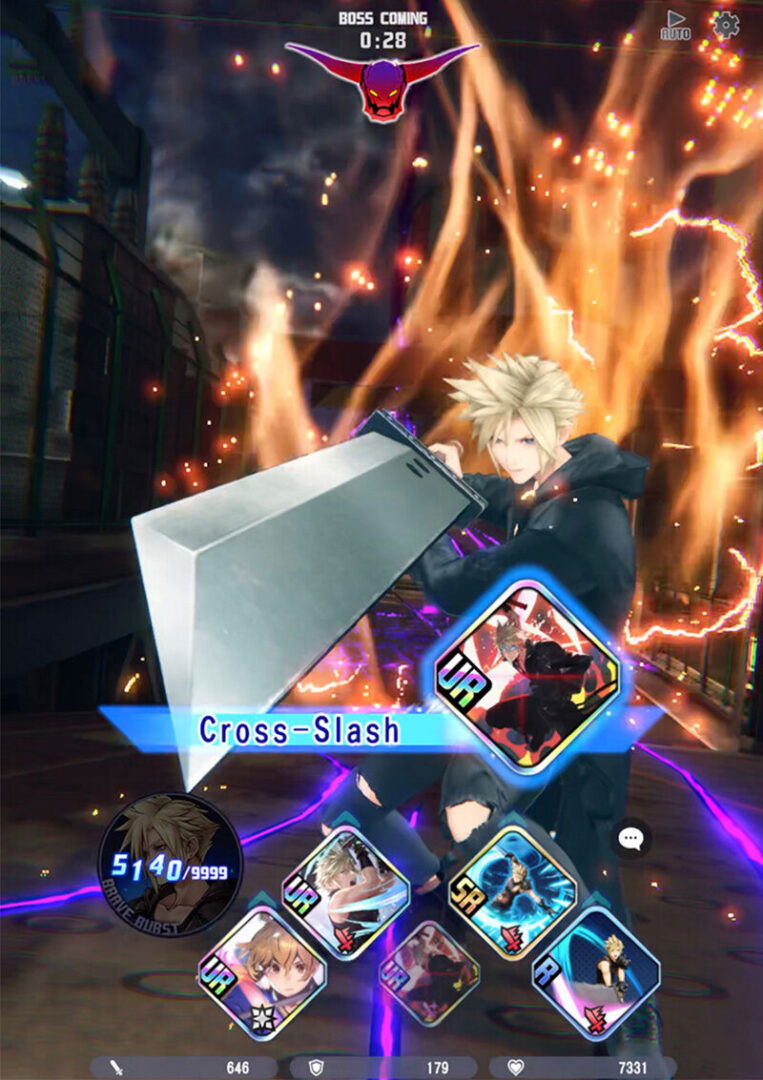
Of course, most Final Fantasy mobile games have some kind of fly in the ointment, and unfortunately Dissidia Duellum has immediately fallen off a ledge that even one of its most ill-fated ancestors dodged.
Final Fantasy VII First Soldier was misguided in many ways, but not without potential, and at least it was wise enough to offer controller support. In fact, I only really played it with a controller, and found it actually enjoyable… when I could find other real players to compete against.
Touch screen controls are great for titles like Ever Crisis or Record Keeper where a tap or two can handle most of your commands, but a large, frenetic, free-roaming game like Dissidia Duellum all but requires the option to play with an external controller. During the beta I found my thumbs and the virtual joysticks traveling all over the screen inadvertently, in the heat of the moment, blocking my view or making camera rotation awkward.
Even though a separate peripheral may not be an optimal solution for every player, and many people might just settle with the touch screen controls if they’re sneaking in a match during their daily routine, Dissidia Duellum is crying out for controller support. Square Enix would be wise to sneak this in near launch, or even shortly after; it may just be a lifesaver.
(Granted, the game’s use of a portrait perspective could potentially make this awkward; most controller-enabled games are meant for landscape orientation, and many great options on the market are meant to even hold your device in that way. However it’d be worth the trade-off to stand the phone up to free your hands for a controller; as-is, the camera controls alone demand the ease of a right stick or bumper buttons.)
A New Opera (Omnia)
The conceptual conceit behind Dissidia Duellum was also intriguing from the beta’s brief exposure. As the Dissidia sub-series slowly goes on, one of its recurring features is combining the casts of various Final Fantasy games for a certain mission, allowing characters whose paths would never officially cross otherwise to bro out (or smack each other around).
None have done this better than Dissidia Final Fantasy Opera Omnia, the unfortunately-named but outstanding mobile game which ran globally from 2018 to 2024. Since it was an ongoing game, not a fighting game with a fixed roster, Square Enix and co-developer Team Ninja managed to bring in almost the entire roster of the mainline series at that time. A few glaring main cast omissions were never rectified, but some extremely niche characters also got a turn in the spotlight.
And not only did Square Enix pull the dolls out of the toybox, they also made them kiss… or rather, team up, or smack each other around, and share in each other’s existential angst (which is debatably as good or better than a smooch). Opera Omnia‘s sheerly massive story brought closure to some long-running emotional wounds and managed to portray each of its 170+ characters with pitch-perfect accuracy.
While it’s unclear at this point how deep Dissidia Duellum‘s roster will run, or how far its story will go, but from the brief interactions seen from the trailers and the beta, it has the potential to follow in Opera Omnia‘s shoes. The real-world setting provides plenty of opportunity for fresh stories and character studides.
And, much like Opera Omnia, the roster has already avoided tying a hand behind its back like the fighting Dissidia games, which stuck to only the main characters and villains almost exclusively. Kain from Final Fantasy IV, Krile from Final Fantasy V, Rinoa from Final Fantasy VIII, and Prompto from Final Fantasy XV made the initial roster instead of their protagonist friends, showing that it has the potential to carry Opera Omnia‘s torch.
Shaky, Mobile Ground
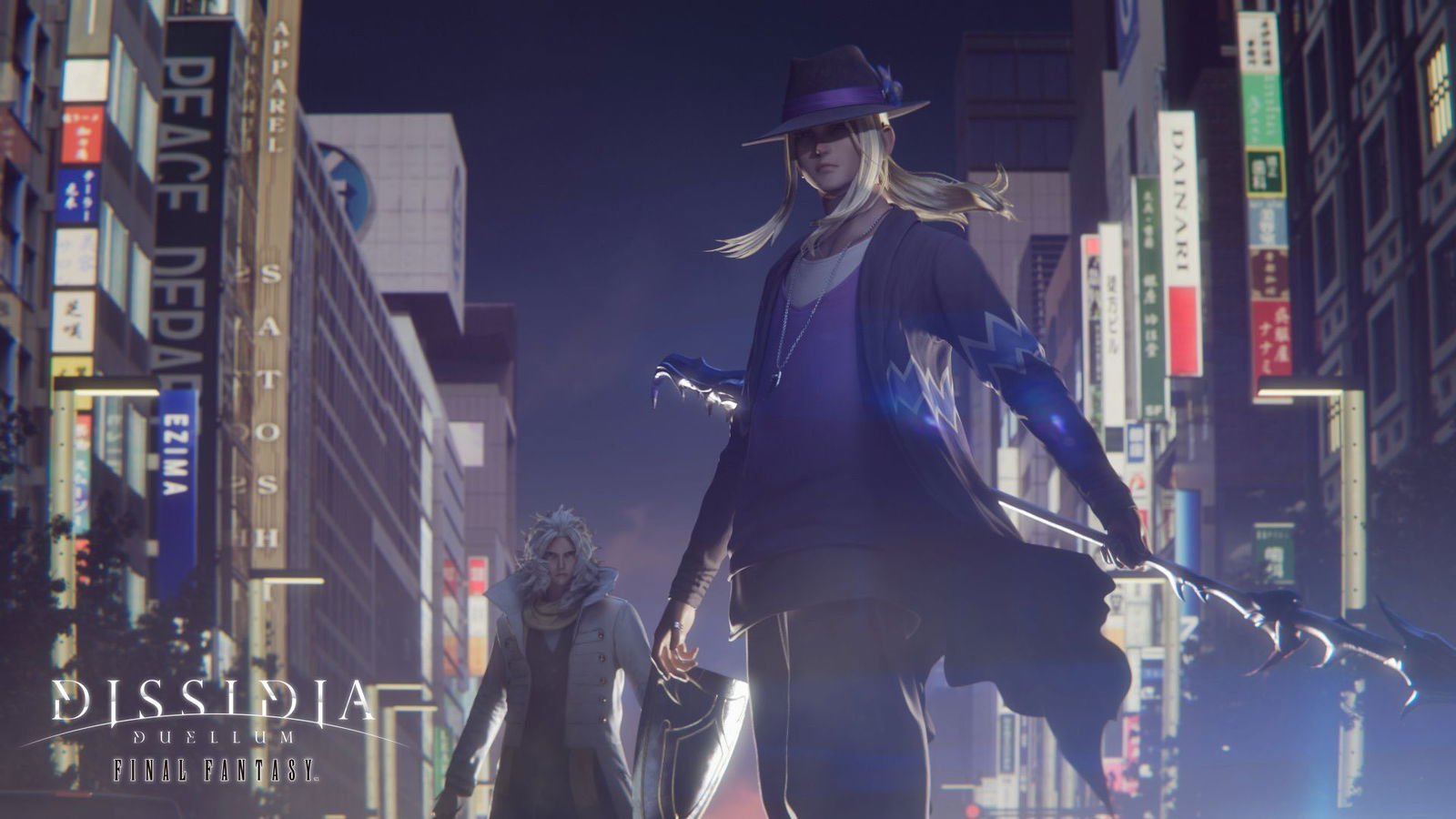
However, the words “mobile game” and “Square Enix” no longer instill much confidence in longtime fans. Of all the Final Fantasy live-service mobile games, only the most recent, Final Fantasy VII Ever Crisis, is still in service worldwide; others have gone done in flames systematically over the past few years as player counts dwindle and the company’s fortunes flail. The First Soldier didn’t even make it a full year before it was terminated.
Thus, fans are understandably hesitant to take the chance on yet another mobile-only game. That’s a big problem before the train even leaves the station, especially when mobile games depend on players being willing to shell out a “few” dollars for in-game purchases periodically. It wouldn’t matter if Dissidia Duellum launched and was considered the objectively best game to bear the Final Fantasy name since Final Fantasy VII—if players are worried it’s not going to stick around, they’re not going to invest time, emotion, or money into it.
A port, remaster, or remake of the original 1v1 Dissidia games is practically essential at this point if Square Enix wants to keep invoking its incredibly Latin name for new, kooky experiments.
And based on my beta experience, that’s a shame. Dissidia Duellum has a surprisingly robust social system, allowing players to express their personalities and experience with the series through tags on their profiles. Through these tags I was pointed toward players with similar interests, and then pointed toward good matchmaking partners. The gacha elements were running with a degree of clemency I wouldn’t expect in the final version, allowing generous rerolls and keeping the currencies flowing, and rates seemed positive (which is more than I can say for Ever Crisis and its soul-sucking stamp system).
If players and the executives at Square Enix can play nice, I think Dissidia Duellum has the potential to be one of the more positive mobile experiences in Final Fantasy history… but time will tell.
…but It’s Still Not Duodecim
Of course, this particular subset of the franchise began with a PSP game: Dissidia Final Fantasy. It was surprisingly robust for a fighting game based on a turn-based RPG series and produced for a beleaguered handheld, but it performed well enough that a successor quickly followed.
Dissidia Duodecim contained the original’s sprawling story and its own comparable campaign, culminating in one of the most fulfilling superbosses I’ve ever had the pleasure of raging against. Despite its Metacritic score, it was a cult sensation: a hybrid RPG-fighting system, plenty of content, fun multiplayer, a story that mashed together the heroes and villains of the mainline games, and tons of easter eggs for longtime fans.
…and everything that’s come after it has failed to live up to it.
The arcade follow-up changed the format to a 3v3 in a vain attempt to chase relevance in the esports community; the original arcade version was successful, but sadly Japan-exclusive, and the console version we got as a consolation, Dissidia NT, felt soulless and empty. Its story mode was contrived and its matchmaking lobbies were either slow, empty, or both.
Dissidia Duellum really may have potential, and if we’re lucky, we’ll keep seeing iconic Final Fantasy heroes sucked into the real world for a long time.
Opera Omnia went on to become one of the best mobile Final Fantasy games, yet it still wasn’t a substitute for the fighting side of the Dissidia formula. And so when Dissidia Duellum was revealed to be anything other than a new take on the original format, players were understandably frustrated.
I say this as someone who’s eager to see them keep trying new things, so long as the dev teams are inspired—be it “PvPvE” online games or even a Hyrule Warriors-esque musou beat-em-up: A port, remaster, or remake of the original 1v1 Dissidia games is practically essential at this point if Square Enix wants to keep invoking its incredibly Latin name for new, kooky experiments.
Dissidia Duellum really may have potential, and if we’re lucky, we’ll keep seeing iconic Final Fantasy heroes sucked into the real world for a long time. But Dissidia Duodecim is just sitting there, ready to be given a simple port or even added to the PlayStation Plus Classics lineup, a bone tossed to a generation of fans who poured hundreds of hours into that unassuming handheld classic. Frankly, it’s baffling that a company that’s so beset by foes and problems could be leaving that easy money on the table, while also taking huge swings on tonally unexpected projects like Dissidia Duellum. Have your cake, Square Enix, but let us eat it too.
(Dissidia Duellum Final Fantasy is scheduled to release on iOS and Android devices sometime in 2026.)





